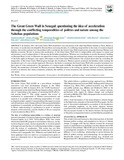The Great Green Wall in Senegal: Questioning the Idea of Acceleration Through the Conflicting Temporalities of Politics and Nature Among the Sahelian Populations
| dc.contributor.author | Macia, Enguerran | |
| dc.contributor.author | Allouche, Jeremy | |
| dc.contributor.author | Basimbé Sagna, Moustapha | |
| dc.contributor.author | Diallo, Amadou Hamath | |
| dc.contributor.author | Boëtsch, Gilles | |
| dc.contributor.author | Guisse, Aliou | |
| dc.contributor.author | Sarr, Pape | |
| dc.contributor.author | Cesaro, Jean-Daniel | |
| dc.contributor.author | Duboz, Priscilla | |
| dc.date.accessioned | 2023-02-28T16:46:06Z | |
| dc.date.available | 2023-02-28T16:46:06Z | |
| dc.date.issued | 2023-02 | |
| dc.identifier.citation | Macia, E.; Allouche, J.; Sagna, M.B.; Diallo, A.H.; Boëtsch, G.; Guisse, A.; Sarr, P.; Cesaro, J.-D. and Duboz, P. (2023) The Great Green Wall in Senegal: Questioning the Idea of Acceleration Through the Conflicting Temporalities of Politics and Nature Among the Sahelian Populations, Ecology and Society 28(1):3, DOI: 10.5751/ES-13937-280131 | en |
| dc.identifier.uri | https://opendocs.ids.ac.uk/opendocs/handle/20.500.12413/17894 | |
| dc.description.abstract | In January 2021, the Great Green Wall Accelerator was announced at the third One Planet Summit in Paris. Based on the notion of acceleration developed by Harmut Rosa and using the idea of conflicting temporalities in the study of social-ecological systems, this article analyzes how the political will to accelerate the Great Green Wall reveals power dynamics between Western and Sahelian countries. We put in tension this acceleration of the Great Green Wall with (1) temporalities with respect to nature and reforestation, and (2) temporalities of life among the Sahelian populations. Whereas our contribution is mostly theoretical, building on Hartmut Rosa’s work, we illustrate our approach in terms of political ecology and anthropology based on an empirical case study of the Ferlo region in Senegal, a key region with respect to the Great Green Wall initiative. Our analysis shows that by controlling the temporality of the Great Green Wall program through this Accelerator, Western powers dominate the Sahelian states, making the Accelerator part of a neo-colonial approach. Moreover, the desire to accelerate the Great Green Wall with a massive investment in a short span of time corresponds to the perception of a nature made available, incompatible with the time of ecological restoration. Finally, the acceleration advocated by Western economic liberalism seems to be coming up against resistance of local populations rooted in an identity that values community solidarity, the stability of social structures, and closeness between humans, their herds, and nature | en |
| dc.language.iso | en_US | en |
| dc.publisher | Resilience Alliance | en |
| dc.rights | Published here under license by The Resilience Alliance. This article is under a Creative Commons Attribution 4.0 International License. You may share and adapt the work provided the original author and source are credited, you indicate whether any changes were made, and you include a link to the license. | en |
| dc.rights.uri | http://creativecommons.org/licenses/by/4.0/ | en |
| dc.subject | Environment | en |
| dc.subject | Politics and Power | en |
| dc.subject | Rural Development | en |
| dc.title | The Great Green Wall in Senegal: Questioning the Idea of Acceleration Through the Conflicting Temporalities of Politics and Nature Among the Sahelian Populations | en |
| dc.type | Article | en |
| dc.rights.holder | Copyright © 2023 by the author(s). | en |
| dc.identifier.externaluri | https://ecologyandsociety.org/vol28/iss1/art31/ | en |
| dc.identifier.team | Resource Politics | en |
| dc.identifier.doi | 10.5751/ES-13937-280131 | |
| dcterms.dateAccepted | 2023 | |
| rioxxterms.funder | Economic and Social Research Council | en |
| rioxxterms.identifier.project | RP/21017 | en |
| rioxxterms.version | VoR | en |
| rioxxterms.versionofrecord | 10.5751/ES-13937-280131 | en |
| rioxxterms.funder.project | b3eb36f1-9eb9-4821-aea5-07b2c57838bf | en |
Files in this item
This item appears in the following Collection(s)
Except where otherwise noted, this item's license is described as Published here under license by The Resilience Alliance. This article is under a Creative Commons Attribution 4.0 International License. You may share and adapt the work provided the original author and source are credited, you indicate whether any changes were made, and you include a link to the license.


